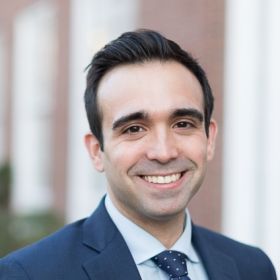David Chan
MBA 2018
MBA 2018
“As an investor, you’re forced to consider whether incentive and alignment are in place for the people you’re working with; you are truly one entity.”
Agriculture was a big part of the rural community in New York’s Hudson Valley where David Chan (MBA 2018) grew up. So was the weather—and Chan loved the drama and scope of storms that sometimes came through the area, so much so that he studied atmospheric science and climate as an undergraduate at Cornell. “Over time, I became more knowledgeable about the science itself,” he says. On visits home, he started to see evidence in his own backyard of changes in temperature and weather, and his focus shifted to the business sectors that would be most affected by climate change.
Natural resources and energy were two obvious areas. Agriculture was another, and it wasn’t as far along in its evolution when it came to innovation and sustainable business models. “It was still an opaque, underinvested market,” Chan says. “Agriculture is 10 percent of GDP and 1 percent of private equity investment.” That fact, combined with trends such as a growing and increasingly urbanized middle class, convinced him that agriculture would be an interesting sector to work in for decades to come.
Chan’s realization led to a post-HBS position at AMERRA Capital Management, an asset manager that has invested over $3.5 billion in agribusiness and aquaculture companies since its founding in 2009. As a senior associate on the private equity team, Chan works closely with management at companies such as Minnesota-based Pipeline Foods, which is building and scaling a supply chain for organic grains in the United States. “Our domestic market for organic grains is underdeveloped because the transition process is extremely difficult and expensive for farmers,” he says. “As a result, the U.S. imports more than 70 percent of some organic grains from China, Brazil, Argentina, and India.” Consumers want to buy organic, Chan explains, but the prices can be prohibitive. Pipeline Foods’ efforts to create more infrastructure and scale in the system could help make organic grains more affordable.
In his collaboration with portfolio companies like Pipeline Foods, Chan says he draws heavily on his first-year coursework in Leadership and Organizational Behavior (LEAD): “As an investor, you’re forced to consider whether incentive and alignment are in place for the people you’re working with; you are truly one entity,” he reflects. “Figuring out how to make that a reality is extremely difficult, but I always think back to our LEAD discussions with Professor Joshua Margolis. He challenged us to really think through what we were saying as if we were in the other person’s shoes. I hope I never forget those lessons because it is so important to be a listener—and not enough leaders today have this skill.”
At HBS, Chan served as Co-President and CFO of the Food, Agriculture, & Water Club, tripling the group’s size from 40 members in his first year to 120 in his second. “People are beginning to see the opportunities in this sector,” he says. “I think that movement will continue to ramp up.” Currently involved in the Harvard Alumni for Agriculture Club, he is focused on increasing opportunities for education and networking in the Club’s New York region. “Harvard doesn’t leave you,” says Chan. “I think it’s great that the learning never ends.”

